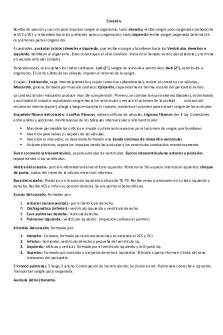Moore Reading - DLauer PDF

| Title | Moore Reading - DLauer |
|---|---|
| Course | PHI2397 |
| Institution | Ottawa University |
| Pages | 4 |
| File Size | 99.9 KB |
| File Type | |
| Total Views | 126 |
Summary
DLauer...
Description
What is Really Unethical About Insider Trading? - Jennifer Moore Insider trader:means the buying or selling of securities on the basis of material, non-public information - not necessarily a corporate insider. “Increasingly, the term “insider” has come to refer t the kind of information a person possesses rather than to the status of the person who trades on that information. My use of the term will reflect this ambiguity. In this paper, an “insider trader” is someone who trades in material, nonpublic information, not necessarily a corporate insider.” Aim of the Paper: ● Examine critically the principal ethical arguments against insider trading; ● Provide the real reasons for laws against insider trading. 1. Ethical Arguments Against Insider Trading Fairness ● "fairness is achieved when insiders and outsiders are in equal positions. That is, a system is fair if we would not expect one group to envy the position of the other . . . reflects the 'golden rule' of impersonal behavior, treating others as we would ourselves. ” ● “all transactions in which there is a disparity of information are unfair, and thus unethical. But this claim seems overly broad.” Lying and deception are kinds of coercion, whereas failing to disclose information is not.” ● ●
●
●
The most common reason given for thinking that Insider trading is unethical is that it is “unfair” The disparity of information between two parties ○ Example: should be played a on level playing field. Disparity in information tilts the playing field towards one individual. First version of the fairness argument: insider trading is unfair because two parties do not have equal information ○ One party is at a disadvantage ‘ ○ Saul Levmore: claims that fairness reflects the “golden rule” of impersonal behaviour - treating other as we would ourselves. All transaction are unfair or unethical. ○ Example: Negotiating a low price for an antique object that you know will sell for 4-5 times that amount somewhere else. ○ Only when someone owes a duty to the other party are they are legally required to reveal all information that is of interest. ○ Cases of insider trading in which no fiduciary duty of this kind is breached would not be unethical. US Supreme Court has taken this position: insider trading is wrong because, and when, it involves the violation of a fiduciary duty to the other parties to the
●
●
●
●
transaction. The Court has consistency refused to recognize the general duty to all investors that is argued for by proponents of the fairness argument. . . . one who fails to disclose material information prior to the consummation of a transaction commits fraud only when he is under a duty to do so. And the duty to disclose arises when one party has information "that the other party is entitled to know because of a fiduciary or other similar relation of trust and confidence between them." . . . The element required to make silence fraudulent, a duty to disclose, is absent in this case. Second version of fairness argument: insider trading is unfair because the two parties do not have equal access to information. ○ It is not the insider’s information advantage that counts, but the fact that this advantage is unprovable, one that cannot be overcome b the hard work and ingenuity of the ordinary investor. ○ Not a very clear argument.. what does it mean for two people to have equal access? ○ Example: Not having access to plumbing information unlike a plumber. This person chose to specialize in this. As could someone chose to become a corporate insider with access to legally protected information. The claim that parties to a transaction should have equal information or equal access to information, inevitably raises questions about how informational advantages are acquired. Or when people are entitled to use them for profit “We frequently think it is fair for people to benefit from informational advantages of their own making; this is an important justification for patent law and the protection of trade secrets.” “Proponents of the fairness argument need to show how the informational advantages of insider traders over ordinary investors are different in kind from the informational advantages of plumbers over the rest of us, or, alternatively, why the informational advantages of plumbers are unfair.”
Property Rights of Information ● Treating information as property (inventions, trade secrets). We protect this information by law. ● Proponent of the property rights argument claims that material, non public information is also a kind of property, and that insider trading is wrong because it involves a violation of property rights. ● Who does inside information belong to? The person who creates/discovers it? ● It is the firm itself (and shareholders) and not the individual employees of the firm who have the property rights in the information. ○ It is the firm that makes it possible to create information (with power and authority) ● “One influential argument is that information belongs to the people who discover, originate or "create" it . . . Thus if a firm agrees to a deal, invents a new product, or discovers new natural resources, it has a property right in that information and is entitled to exclusive use of it for its own profit.”
●
●
“If insider information is really the property of the firm that produces it, then using that property is wrong only when the firm prohibits it. If the firm does not prohibit insider trading, it seems perfectly acceptable” If this analysis is correct, then insider trading is wrong because it is a form of theft.
Harm ● Insider trading is harmful to ordinary investors? ● The first harm-based arguments against insider trading: claims to the practice is harmful to ordinary investors who engage in trades with insiders ● The second harm-based argument claims that insider trading erodes investors confidence in the market. (Causing them to pull out of the market and harming the market as a whole) ○ Weakness of this argument: it turns almost exclusively on feelings or perceptions of ordinary investors, does not address the question of whether these perceptions are justified. ● Proponents of insider trading argue that large trades by insiders move the price of shares closer to their "real" value, that is, the value that reflects all the relevant information about the stock. This makes the market more efficient and provides a valuable service to all investors. ○ For example, Martha Stewart’s inside sale of ImClone shares lowered the value of the stock buffering the fall when the FDA made its public announcement. 2. Is there anything wrong with Insider Trading? ● Moore’s contention has been that the principal ethical argument against insider training do not, by themselves, suffice to show that the practice is unethical and should be illegal. ● The strongest argument are those that turn on the notion of fiduciary duty to act in the interest of shareholder, or on the idea of inside information as company “property’ ○ Both these argument require a contractual agreement ● If permitting insider trading is to work in the way proponents suggest, there must be a direct and consistent link between the profits reaped by insider traders and the performance that benefit the firm. ● Ways to profit from inside information that do not benefit the firm at all: ○ Proponents of insider trading tend to spread as if all information is positive. Permission to trade on negative inside information gives rise to inevitable conflict of interest ○ Proponents of insider trading also assume that the easiest way to profit on inside information is to “create” it. The invention of information is in the interest of neither of the firm not of society at large ○ Even if negative or false information did not pose problems, the incentive argument for insider trading overlooks the difficulties posed by “free
○
riders” = those who do not actually contribute to the creation of information. Allowing trading on inside information would tend to deflect employees attention from day-to-day business of running the company and focus it on major change, positive or negative, that lead to large insider trading profits.
Because it threatens the fiduciary relationship that is central to business management, permitting insider trading is in the interest neither of the firm, its shareholders, nor society at large. ● Permitting employees to profit from harms to the company decreases the incentive to avoid such harms. Permission to trade on negative inside information gives rise to inevitable conflicts of interest. ● Rumours. If permitting insider trading provides an incentive for the productive "creation" of information, it seems to provide an even greater incentive for the non-productive "invention" of information, or stock manipulation. The invention of information is in the interest neither of the firm nor of society at large. ● Instability. Insider trading may deflect employees' attention from the day-to-day business of running the company and focus it on major changes, positive or negative, that lead to large insider trading profits. There is no long-term benefit for steady company performance. ● Erosion of trust and consequent rise of inefficiency. Fiduciary roles that are violated means trepidation among investors and less money flowing into the market. 3. Conclusion ● Moore believes that lifting the ban against insider trading would cause harms to shareholders, corporations, and society at large. ● These harms stem primarily from the coach in the fiduciary relationship caused by permitting insider trading, rather from actual trades with insiders. ● Violation of fiduciary duty in short, is at the Center of insider trading offences....
Similar Free PDFs

Moore Reading - DLauer
- 4 Pages

Freeman Reading - DLauer
- 3 Pages

Carr Reading - DLauer
- 4 Pages

Embriología Muscular Moore
- 13 Pages

Corazon resumen moore
- 7 Pages

The Other Wes Moore
- 5 Pages

Guia Examen Embriologia - Moore
- 36 Pages

ANATOMIA del Corazon- Moore
- 9 Pages

Resumen Capitulo 2 Moore
- 17 Pages

4° semana, Moore
- 5 Pages

Yeyuno e íleon moore
- 3 Pages

Ellen Moore case study
- 6 Pages

Apuntes sobre Corazón-Moore
- 1 Pages

Mediastino anatomia moore
- 6 Pages
![[Moore] Matlab para ingenieros](https://pdfedu.com/img/crop/172x258/ze6dgmwj8pe0.jpg)
[Moore] Matlab para ingenieros
- 620 Pages
Popular Institutions
- Tinajero National High School - Annex
- Politeknik Caltex Riau
- Yokohama City University
- SGT University
- University of Al-Qadisiyah
- Divine Word College of Vigan
- Techniek College Rotterdam
- Universidade de Santiago
- Universiti Teknologi MARA Cawangan Johor Kampus Pasir Gudang
- Poltekkes Kemenkes Yogyakarta
- Baguio City National High School
- Colegio san marcos
- preparatoria uno
- Centro de Bachillerato Tecnológico Industrial y de Servicios No. 107
- Dalian Maritime University
- Quang Trung Secondary School
- Colegio Tecnológico en Informática
- Corporación Regional de Educación Superior
- Grupo CEDVA
- Dar Al Uloom University
- Centro de Estudios Preuniversitarios de la Universidad Nacional de Ingeniería
- 上智大学
- Aakash International School, Nuna Majara
- San Felipe Neri Catholic School
- Kang Chiao International School - New Taipei City
- Misamis Occidental National High School
- Institución Educativa Escuela Normal Juan Ladrilleros
- Kolehiyo ng Pantukan
- Batanes State College
- Instituto Continental
- Sekolah Menengah Kejuruan Kesehatan Kaltara (Tarakan)
- Colegio de La Inmaculada Concepcion - Cebu
